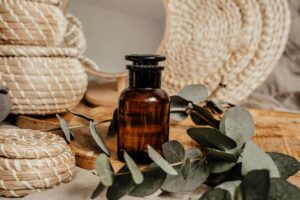Navigating the Skincare Spectrum

In the ever-evolving landscape of skincare, two terms have gained significant traction: clean beauty and organic beauty. While both concepts advocate for safer, more natural alternatives to conventional skincare products, they approach ingredient sourcing, formulation, and certification differently. In this blog post, we’ll delve into the distinctions between clean and organic beauty, helping you make an informed decision about which is better suited for your skincare needs.
Understanding Clean Beauty
Clean beauty emphasizes the use of safe, non-toxic ingredients that are thoughtfully sourced and transparently labeled. Clean beauty products prioritize excluding potentially harmful substances such as parabens, sulfates, phthalates, and synthetic fragrances. Instead, they utilize natural, plant-based ingredients and carefully curated synthetics that are deemed safe for both the skin and the environment.
The focus of clean beauty extends beyond ingredient safety to encompass sustainability, ethical sourcing, and transparency in manufacturing practices. Clean beauty brands often adopt eco-friendly packaging, minimize waste, and support ethical supply chains to reduce their environmental impact and promote social responsibility.
Exploring Organic Beauty
Organic beauty, on the other hand, places a primary emphasis on using ingredients that are certified organic, meaning they are grown and processed without synthetic pesticides, herbicides, or fertilizers. Organic beauty products must meet strict standards set by certification bodies such as the USDA (United States Department of Agriculture) or COSMOS (Cosmetic Organic Standard).
By prioritizing organic ingredients, organic beauty products aim to minimize exposure to potentially harmful chemicals and promote environmental sustainability. Organic farming practices support soil health, biodiversity, and long-term ecological balance, making them an appealing choice for environmentally conscious consumers.
Key Differences Between Clean and Organic Beauty
- Ingredient Focus: Clean beauty focuses on ingredient safety and transparency, utilizing a combination of natural and synthetic ingredients that are deemed safe for the skin. Organic beauty prioritizes certified organic ingredients, excluding synthetic pesticides and fertilizers from the cultivation process.
- Certification Standards: Clean beauty products may or may not be certified by third-party organizations, as certification is not a requirement for labeling products as “clean.” Organic beauty products must meet strict certification standards set by recognized organizations to be labeled as “organic.”
- Environmental Impact: Both clean and organic beauty prioritize sustainability, but organic beauty places a greater emphasis on environmentally friendly farming practices. Organic farming methods support soil health, biodiversity, and natural resource conservation, contributing to long-term ecological sustainability.
- Availability and Accessibility: Clean beauty products are more widely available and accessible, as they encompass a broader range of ingredients and formulation practices. Organic beauty products may be less common and often come with a higher price tag due to the cost of organic certification and sourcing.

Making the Choice: Which Is Better for You?
Ultimately, the choice between clean and organic beauty comes down to personal preferences, values, and skincare needs. If ingredient safety and transparency are your primary concerns, clean beauty may be the right choice for you. Clean beauty offers a diverse range of products formulated with non-toxic ingredients that prioritize skin health and environmental responsibility.
On the other hand, if you prioritize certified organic ingredients and support environmentally sustainable farming practices, organic beauty may be more aligned with your values. Organic beauty products provide assurance that the ingredients have been produced without synthetic pesticides or fertilizers, promoting both personal and planetary health.
In conclusion, both clean and organic beauty offer viable alternatives to conventional skincare products, emphasizing ingredient safety, environmental sustainability, and transparency. While clean beauty focuses on using safe, non-toxic ingredients with an emphasis on transparency and ethical sourcing, organic beauty prioritizes certified organic ingredients grown and processed without synthetic chemicals.
Whether you choose clean beauty or organic beauty, the most important thing is to make informed decisions that align with your values and skincare needs. By understanding the distinctions between these two concepts, you can confidently select products that promote both personal well-being and environmental stewardship, contributing to a healthier, more sustainable beauty industry.




